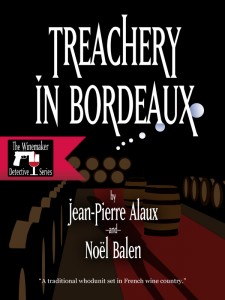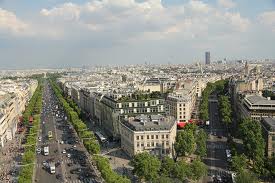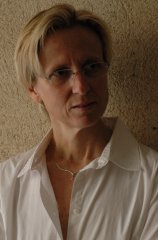Jean-Pierre Alaux and Noël Balen are two French authors who write a whodunit series set in wine country. They are Epicures. Jean-Pierre is a magazine, radio and television journalist when he is not writing novels in southwestern France. He is a genuine wine and food lover and the grandson of a winemaker. Noël lives in Paris, where he shares his time between writing, making records, and lecturing on music.
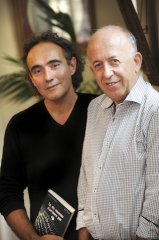 (Noël Balen and Jean-Pierre Alaux)
(Noël Balen and Jean-Pierre Alaux)
The first in the Winemaker Detective series, TREACHERY IN BORDEAUX, was recently published in English by Le French Book, a digital-first publisher of France’s best crime fiction and thrillers in English. The Winemaker Detective series now has 20 titles in French.
(Disclaimer: Any winery information I provide about Washington State in this interview was learned through research on the Internet, and I can’t vouch for its accuracy.)
ME: First of all, I couldn’t help noticing that the main character in TREACHERY IN BORDEAUX, Benjamin Cooker, a winemaking consultant in his fifties, and his younger, handsome assistant, Virgile, somewhat resemble the two of you. Am I imagining this, or did you indeed fashion the two characters after yourselves in some small measure?
JP AND N: Unfortunately, or perhaps fortunately, we are both over fifty, but there is clearly a part of us in Benjamin Cooker, with his somewhat sarcastic view of life, a relative distance in the face of life’s hardships, a sense of memory, and some wisdom in the observation of human passions. However, we drew inspiration from our own children and their friends to develop the character of the young assistant, Virgile, who to us represents an optimistic view of the world. He is sometimes candid and decidedly enthusiastic, with a thirst for learning and always the same energy.
ME: In any case, why did you decide to make your protagonist part British? Why not purely French?
JP AND N: It was important for us to have a perspective of the wine world that was not ethnocentric, and that goes beyond France’s borders. The vineyards in Bordeaux, Burgundy and Champagne are certainly incomparable, but we are aware of the wealth and variety of wine produced worldwide.
Also, there is a long-standing tradition of wine making and appreciation in Britain and throughout the English-speaking world that we thought interesting to highlight. Historically, the English have contributed a lot to the science of oenology (Note: that’s the study of wines for the uninitiated like me), and they left their cultural mark in the Aquitaine region, and particularly in Bordeaux. And, of course, there is the fact that the British have a certain number of legendary figures in the mystery arena, not the least of which being Agatha Christie and Arthur Conan Doyle. We thought the blend was a fine way to pay homage.
(Indeed!)
ME: You have both been described as epicures–those who take pleasure in fine food and drink. How did your paths first cross, and how did you happen on this approach to a mystery series?
JP AND N: Our meeting occurred during a cocktail party that ended up with a fine meal, which of course bode well for the future. The conversation quickly turned to our shared passion for wine and our first thought was to create a crime fiction series focusing on the world of winemaking for television. A wine and crime series had not been done. When we were asking around at the French publishing house, Fayard, for contacts in TV, we were surprised to get an immediate proposal to publish the novels.
We owe this to Claude Durand, who was heading up Fayard at the time, and who supported the project and gave us long-term possibilities by signing on the first ten titles right away. (I like how the French do things!) The series’ success led to a contract for another twelve books. The television series was then the next logical step, considering the project’s origin. Now, each of the novels is adapted for TV. The third season is being written now, and will be shot this summer.
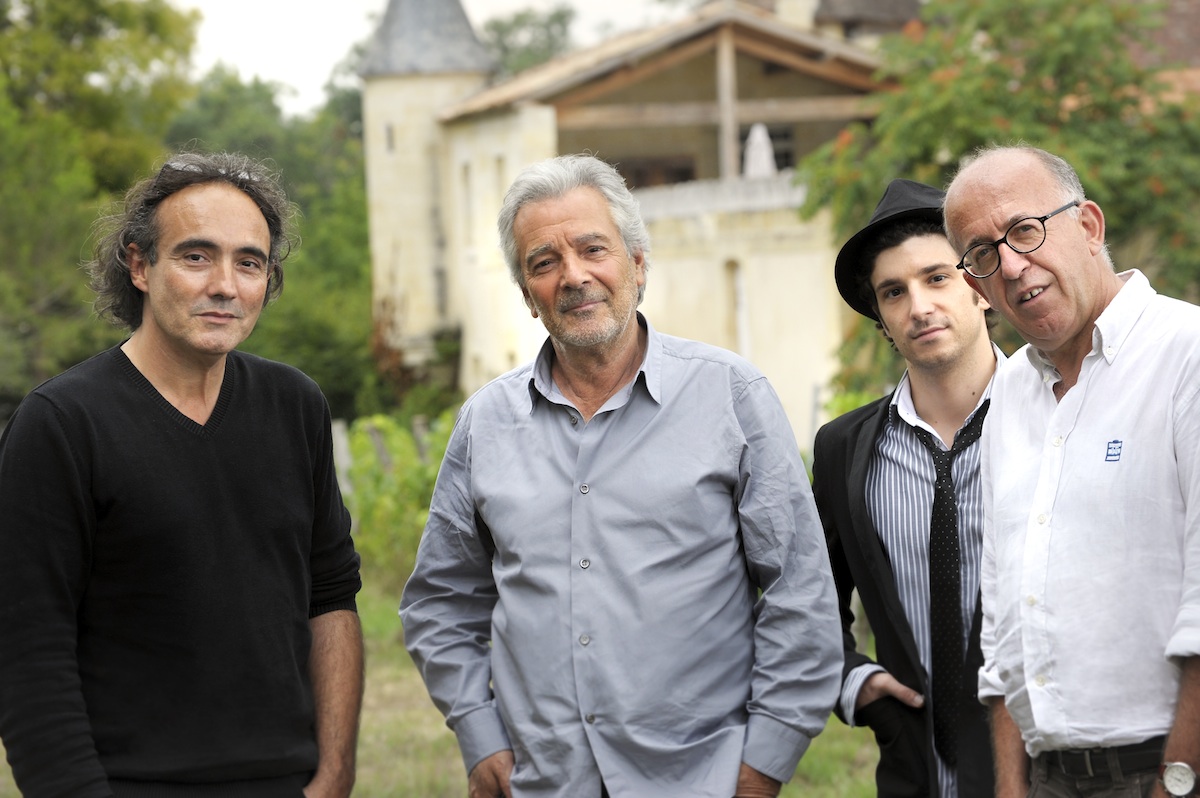 (Noël and Jean-Pierre flanking the stars of the TV series)
(Noël and Jean-Pierre flanking the stars of the TV series)
ME: As I understand it, the twentieth book in the series came out this past fall, and the pair travels to wine estates not only in France, but around the world. How many of the books are set in the United States? And have you yet visited any of the vineyards in Eastern Washington where I live?
JP AND N: Our characters have visited vineyards in Hungary (Tokay) and Spain (Rioja and Ribera Del Duero). We often mention wines from other countries in the stories, and in one of the books, we cover the Napa Valley in more detail, because an investor from California purchases property in the area around Bordeaux. We are also planning on setting a plot in Tuscany to celebrate Italian wines. So why not discover the vineyards in Washington State? We will admit to not being familiar with these wines and it would be a real pleasure to go and taste them in person. Discovering a new wine region is always a fabulous experience. When is the best time to come?
(Spring, early summer and fall, according to Wine Enthusiast Magazine. Avoid July and August.)
ME: Jean-Pierre, you have said, “The world of wine is no more respectable than the world of finance . . . [it] has all the requirements for a detective novel: death, crime, inheritance, jealousy. You name it, all human weaknesses are present.” My question is, do the two of you ever base your plots on actual stories in newspapers or magazines, whether French or not?
JP AND N: In our experience, reality always exceeds fiction. We will often imagine particularly nasty scandals, terrible violence, warped backstabbing and the most twisted acts, and then when we start digging through local archives, exploring history and even more recent news, we are surprised to find that people have never lacked imagination when it comes to harming their neighbors. The novelist’s job is to put the darkness of the human spirit to music, turning what defies comprehension into a credible story. (That’s a great quote!)
ME: Now that your series has become a TV hit in France, has it made it a bit more difficult to travel around and do research to capture the history, traditions and flavor of a locale? How important is the setting in your stories?
JP AND N: Every region has its own specific, singular and absolutely incomparable context. That is what is so incredible about the world of winemaking. Every aspect–the region’s geography and geology, the human factors and social ramifications, the specific climate, the culinary tradition, political choices, and historical events–becomes palpable when you are attentive and receptive.
When we go out researching, we focus both on the people we meet, on their attachment to the region and their way of approaching their work, as well as the numerous details we observe in the field (architecture, nature of the soil, local festivities, etc.). We are very careful to note all the details that contribute to a region’s flavor, its local culture and way of life, right down to the smallest door stud (in copper or porcelain) and the most insignificant road taken (be it paved or unmaintained).
(Okay, if you’re coming to Washington, you might want to check out the wineries on the western side of the state in April when the Tulip Festival takes place in Skagit County.)
ME: When did each of you know you wanted to be a writer, and what was your first attempt at creative writing?
JP: I’m less driven by the idea of being a writer than that of telling stories. My work as a reporter was quick to take the mystery out of the act of writing. Being a journalist is more often than not about telling a story with both realism and imagination in order to make things understandable to readers. My first books were short stories, then biographies and finally novels. One thing led to another until writing became a daily part of my life.
N: Writing is a natural addition to a life that focuses on music. As a child, I read a lot, then later I worked as an instrumentalist and then a record producer. I never envisioned doing anything other than writing and composing. In books, I look for the rhythm, the melody, the harmony, and the alchemy of notes. It doesn’t matter what the story is, as long as the partition invites the reader to take the voyage. My first book was a collection of noir stories, followed by several novels, along with musicology essays and biographies.
ME: I know that one of you uses a Mac and the other a PC, but I’m wondering what each of your writing spaces look like. Where and when do you do your best writing?
JP AND N: Yes, one is Mac and one is PC, but that is just a fun detail. Our respective working tools are a sign of how we complement each other and they make us very compatible despite our differences. Jean-Pierre is very attached to his region and his house perched above the Lot River valley, while Noël love Paris a stone’s throw away from the Champs-Elysée.
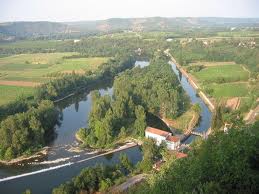 (A view of the Lot River Valley)
(A view of the Lot River Valley)
(Downtown Paris and the Champs Elysée)
Jean-Pierre works better in the morning, and Noël is a night owl. Our approaches are different and our lifestyles pretty much opposite each other, but we share a number of common points, which is our strength and what holds us together. In addition to our love for food and wine, we also share the same tastes for painting, literature, antiques, outdoor cafés, Moleskine notebooks for jotting down our ideas (YAY! My regular readers know how much I like Moleskine notebooks!), fires in the fireplace and old buildings.
ME: I read an excellent review of your co-authoring process on the blog, Mystery Fanfare, but how do you manage to fold two separate first drafts (based on a mutually formed outline) into one finished manuscript? How long does it generally take?
JP AND N: One of us is responsible for doing the fieldwork and writing the first draft, based on a pre-approved plot line. With observations from the sites and an in-depth knowledge of how things are done there, he can give a better feel for the observed reality. The final polishing is then done by the other one, although occasionally, we’ll both do it together.
The time it takes to complete a book varies a lot, but we can say it takes an average of six months between the basic idea and the final manuscript. It depends on the subjects as well as our available time, because we also write our own books in addition to the series.
ME: Finally, how many more books do you envision for the series, and have you thought about working together on any other kind of series?
JP AND N: We have the feeling that this writing adventure is a never-ending source of inspiration, kind of like the image of the Daughters of Danaus, whose task was never completed, except that for us it is never a punishment. There is still so much to learn, so many regions to explore, mysteries to unveil and wines to discover. As long as our health permits (helped with some reasonable wine consumption, perhaps), we will continue our explorations. Our readers, and now our television audience, are pushing us to continue, and we can’t let them down.
(Hopefully, they’ll travel to Washington State for one of their future novels.)
Next Wednesday I’m interviewing Frédérique Molay, who won France’s most prestigious crime fiction award for her novel, THE 7TH WOMAN, an international bestseller.
Originally posted 2013-01-30 14:11:28.

